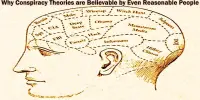A conspiracy theory is a belief or explanation that suggests a group of people or organizations are involved in a secret or illegal plan to accomplish a sinister or harmful goal. A conspiracy is a secret plan to do something bad or harmful. It’s important to approach conspiracy theories critically and to be skeptical of information that lacks evidence or relies on unreliable sources.
The objective of conspiracies is usually to “usurp political or economic power, violate rights, infringe upon established agreements, withhold vital secrets, or alter bedrock institutions.”
What are conspiracy theories?
Alternative explanations known as conspiracy theories link the real reason of a significant sociopolitical event to sinister plans carried out by apparently powerful individuals or groups (e.g., the Jews, government, corporations, wealthy elites).
There are conspiracy theories about many things: vaccinations, moon landings, climate change, the 9/11 attacks, JFK’s assassination, etc.
Note that conspiracy theories are not always wrong (e.g., the Watergate scandal). In fact, belief in conspiracy theories can even be adaptive.
But frequently enough, conspiracy theories are wrong. Indeed, major conspiracies often fail or are exposed sooner or later.
What does narcissism mean?
Narcissism refers to grandiose self-regard. The traits of narcissism include hostility toward rivals, feelings of superiority and hubris, jealous tendencies, a sense of entitlement, manipulativeness, and self-promotional conduct.
Despite the fact that many people believe in conspiracies, research indicates that narcissists are especially likely to do so, just as they are likely to believe in other strange or irrational phenomena.
Cichocka et al. note, “Overall, meta-analytic effects ranging from r = 0.22 to r = 0.26 suggest that narcissism is one of the best psychological predictors of conspiracy beliefs.”
The authors contend that three aspects of narcissism that underlie it are connected to conspiracy theories via several mechanisms.
These three facets of narcissism are:
- Agentic extraversion: Related to being assertive, self-confident, charming, and reward-seeking. This is how narcissists try to gain the admiration of others.
- Antagonism: Associated with being arrogant, callous, dishonest, distrustful, exploitative, and entitled. This is how narcissists defend themselves against threats and compete with rivals.
- Neuroticism: Linked with the experience of shame, low self-esteem, negative emotions, and relationship difficulties.
The link between narcissism and conspiracy beliefs
Paranoia, the need for dominance, the desire for uniqueness, and gullibility
Paranoia is more prevalent in narcissists and those with other negative personality traits like psychopathy and Machiavellianism than in the general population.
Narcissists often assume others are “out to get them.” Perhaps it is these paranoid perceptions of threats to the self that give rise to beliefs about conspiracies and threats to society.
The need for control and dominance, combined with the anticipation of defeat, is also associated with the belief in conspiracies.
After all, scapegoating others is simpler than admitting failure to people who have a strong need for control and dominance.
The desire for individuality, which is frequently linked to the agentic extraversion component of grandiose narcissism, may also make someone more likely to believe in conspiracies. Why? Because being able to see through the “smoke screens that hide the incredible truth” could give narcissists a “sense of being special, of being one of the few people who see the truth.”
Another factor is gullibility: Narcissists are often overconfident, yet they may also be incredibly gullible and naive. This might be partially explained by their propensity to act on instinct rather than reason.
Narcissists frequently hold strange and outlandish ideas, such as believing in astrology or conspiracy theories, which may also be explained by an overreliance on intuition and gut sensations.
Collective narcissism
According to some study, persons who exhibit a higher level of collective narcissism the propensity to make overly optimistic judgments about one’s group appeal to conspiracy theories.
The link between collective narcissism and conspiracy theories can be explained, according to the authors, “by the exaggerated intergroup threat sensitivity of collective narcissists, analogous to the paranoia and threat sensitivity of individual narcissists.”
In addition, people who assume their group (e.g., country) is entitled to special treatment, may feel it necessary to deny national shortcomings and blame any failings on external agents (e.g., other countries) conspiring against them.
Furthermore, the “motivation to restore personal control strengthens the association between collective narcissism and outgroup conspiracy beliefs, echoing the role of control and dominance motives in individual narcissism.”
Narcissistic leaders
Let me discuss why narcissists’ interest in conspiracy theories is so concerning:
Narcissists are more successful than the typical individual at achieving positions of power, including becoming elected leaders (a phenomenon observed even in narcissistic children). Indeed, narcissism is a trait shared by many political figures, especially populists and autocrats.
Also, narcissistic political figures are more likely to spread conspiracies, especially when they see their hold on power to be eroding.
Consequently, it has more impact when influential leaders attribute their own shortcomings or misfortunes to a group of conspirators. Why? Because by promoting conspiracy theories, narcissistic leaders can cause significant societal harm be it discouraging political engagement, encouraging unhealthy beliefs and behaviors (e.g., the anti-vaccination movement), discrimination, or acts of violence.
Takeaway
As we have seen, narcissists are drawn to conspiracy theories for reasons potentially related to:
- Paranoia
- Gullibility
- Need to dominate and be in control
- The desire to draw attention to themselves
- The tendency to blame others for their own failures or misfortunes
- The desire to manipulate others (e.g., social media followers on Twitter or Facebook)
And we have seen that these beliefs may encourage negative behaviors, including violence.
So, what is the alternative? Believing everything one is told?
No, there is a middle ground. The official versions of significant events and conspiracy theories should both be viewed with a fair dose of skepticism. This is not what conspiracy believers do because, as research shows, they “have less developed critical thinking ability.”
















